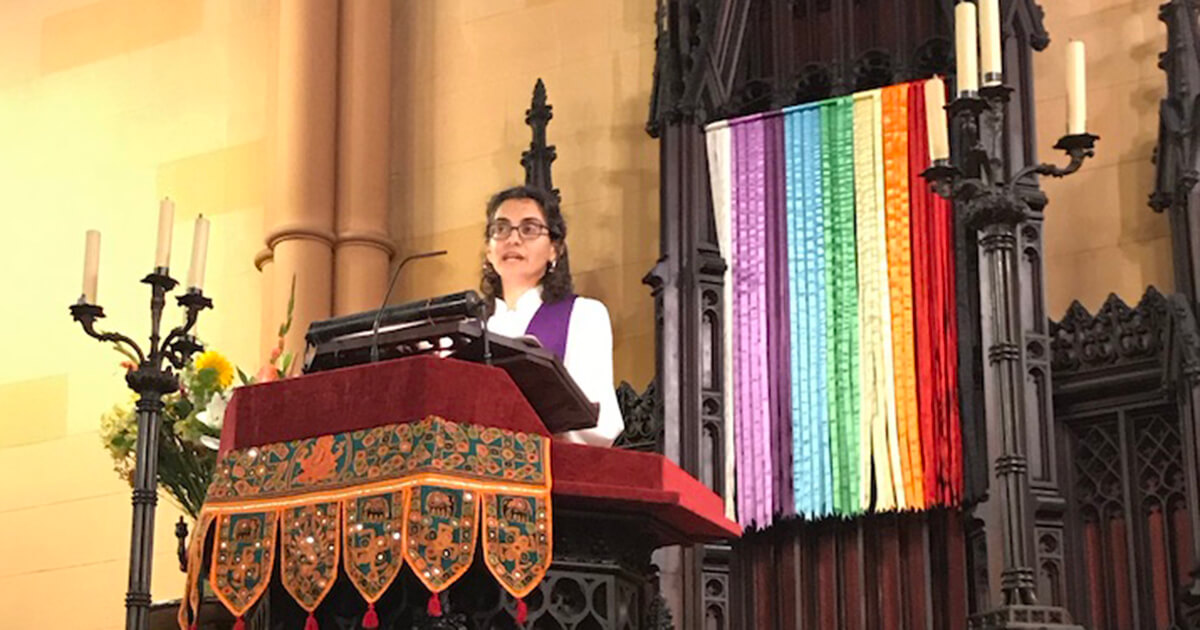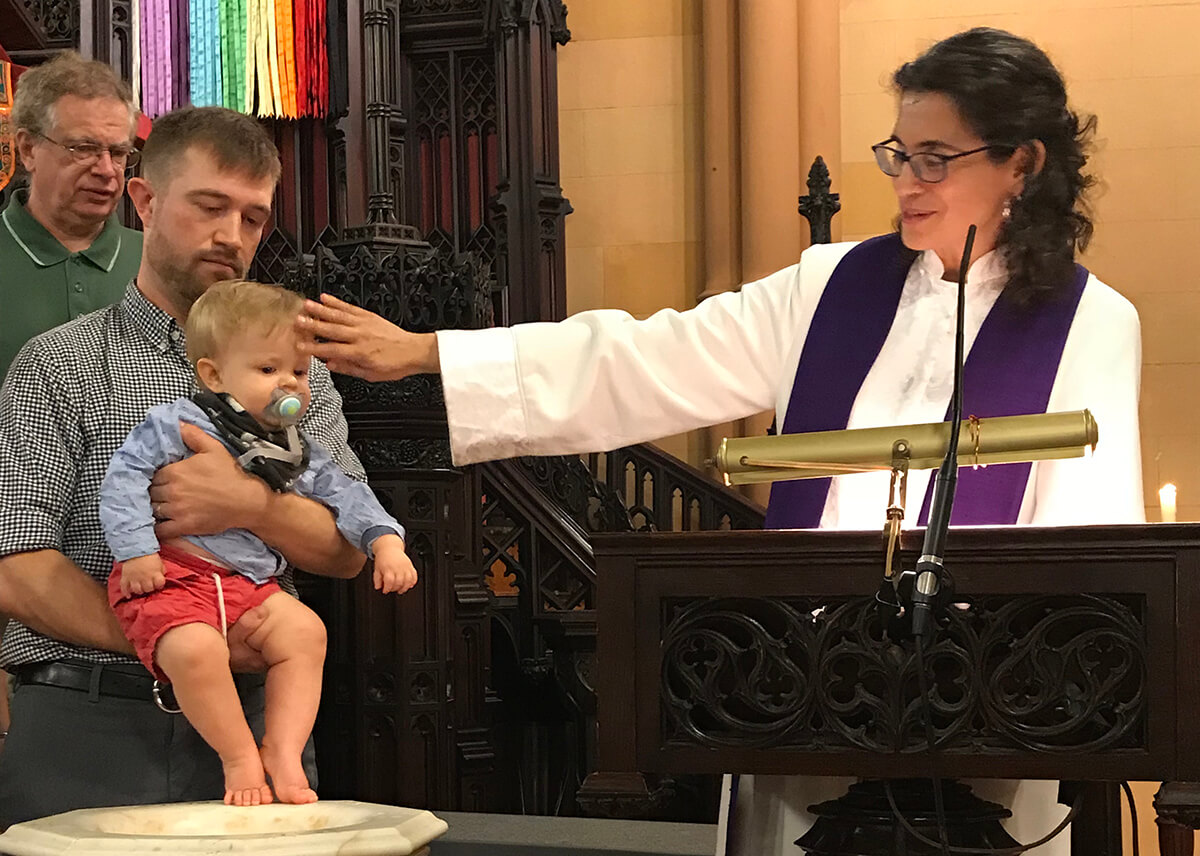She was a successful minister. Then Hamas attacked Israel and now she’s becoming a rabbi
Rev. Ana Levy-Lyons, who discovered she was Jewish later in life, found that the terrorist attack brought up buried trauma

Rev. Ana Levy-Lyons delivering a sermon at the First Unitarian Congregational Society in Brooklyn. Photo by Debra Nussbaum Cohen
Debra Nussbaum Cohen spent several Sundays attending services at the First Unitarian Congregational Society and interviewing Rev. Ana Levy-Lyons both in person and on the phone.
For Rev. Ana Levy-Lyons, a Unitarian Universalist minister in Brooklyn, the Hamas attack changed her life in a unique way.
It led Levy-Lyons to quit her role as spiritual leader of the First Unitarian Congregational Society after a dozen successful years there. She’s now focusing on studying to become a rabbi.
Levy-Lyons is Jewish, something she discovered only in her 20s, when a cousin let the family secret slip. It was something her parents had worked hard to deny. Her father had changed the family’s last name. Her family lived as so many do, as American atheists.
Leaving Unitarianism is a big step; her adult life has been bound to Unitarianism since she was ordained a minister in 2007. Levy-Lyons met her husband, Jeff Lyons, when she was interning in her first pulpit, and he was on that congregation’s board. They bonded over their shared Jewish heritage, which neither, at the time, was involved with. It was when they married, also in 2007, that she reclaimed her family’s original and unmistakably Jewish last name: Levy.
Levy-Lyons is soft-spoken in person. But on the pulpit at the Brooklyn Heights congregation, when she gave well-written sermons that doubled as social commentary (I attended a few), she was a powerful figure.
Many rabbis have struggled with how to navigate the strong — at times conflicting — views of their congregants about the war in Gaza. But for Levy-Lyons, it has been a life-changing crisis.
After the war began, members of her left-leaning Unitarian congregation pressed her to issue a statement condemning Israel without qualification for the deaths in Gaza caused by its war against Hamas.
She just couldn’t do it, she said in an interview. As a Jew, she sees the war in a more nuanced way than many of her congregants, she said. She also found herself suddenly feeling isolated from the progressive left, of which she has long counted herself a part.
The 51-year-old has been pained by Hamas’ terrorist attack in a way she believes her congregants don’t understand, and feels that she has been “coming out as a Jew all over again” since then.
The terrorist attack and ensuing war forced a reckoning with her long-muted Jewish identity. To her surprise, she found herself dealing with internalized Jewish trauma.
“It’s ironic,” she said, “given that my entire life I didn’t think antisemitism was a thing in this country anymore. I never really got it. Then Oct. 7 happened. It was the reaction from the progressive left in this country that has been startling and terrifying,” she said.
“Suddenly, I just started to only feel safe around Jews. I sense that people have some suspicion of me because I’m Jewish, and people wonder if I’m the ‘right’ kind of Jew or the ‘wrong’ kind of Jew,” she said.
A revealing statement to congregants
Things took a turn on March 22, when Levy-Lyons sent the 1,200 member congregational email list a letter about the war. “That was Purim weekend, and it was my Esther moment, coming out as Jewish in a way I hadn’t before,” she said, referencing the Biblical Queen Esther who, at first, hid her Jewish identity.
About 10 percent of members of her congregation have Jewish background and are married to non-Jews, she said.
In her letter she wrote, “I am a Unitarian Universalist minister instead of a rabbi because of antisemitism. Specifically, it was the antisemitism my parents faced growing up in 1950s New Jersey that drove them to hide their Jewishness and to raise me not even knowing that I was Jewish.”
She continued: “When I found out that I was Jewish in my 20s, it felt like an unalloyed gift. I was heir to this gorgeous tradition of spiritual practices, rituals, music, and texts, dazzling in their breadth and depth. I believed that antisemitism was mostly a thing of the past, oddly unaware of how it had quite literally shaped my entire life. But on Oct. 7, my people were slaughtered again — some of them peace activists and environmentalists, parents and children, Jews very much like me and my family except that the vagaries of history and fate had landed them there instead of here. I am two degrees of separation from people who were murdered or taken hostage on that day. Over the months since, I have discovered that I am Jewish for the second time. I have realized that I am heir, not only to the beauty of the lineage, but also to the trauma.”

The letter took congregants by surprise, said Robin Bossert, an immediate past co-president of First U. Bossert, whose mother was Jewish, had followed Levy-Lyons from her first New York City Unitarian Universalist pulpit, at All Souls NYC on the Upper East Side, where she was acting assistant minister.
‘We are in mourning’
Before Levy-Lyons sent the letter, the Brooklyn Heights Association had rented First U’s sanctuary for its annual meeting. Its featured speaker was Sen. Kirsten Gillibrand, a Democrat from New York. Before she could start speaking at that March 4 meeting, pro-Palestinian attendees stood up and shouted her down. The police were called, and though no one was arrested at the request of First U., Gillibrand left the Gothic church building before giving her presentation. While that didn’t directly involve Levy-Lyons, the incident reflected the inflammatory moment playing out at the congregation.
Three weeks after sending her letter, Levy-Lyons sent another to her congregants on April 12. In it, she resigned.
“She was beloved by most of the congregation, and people are shocked,” Bossert said. “We are in mourning.”
While some of her congregants were aware that she was Jewish, none realized that it was her central identity, or that she was in rabbinical school, Bossert said.
She had written into her contract with the congregation (which, like many Unitarian Universalist congregations, does not like to be called a church) that she would get Saturdays off, except in the case of a death or wedding at First U. She and her family are Sabbath observant, she said, and active members of Romemu, the Jewish Renewal congregation on Manhattan’s Upper West Side.
Denomination passes resolution in solidarity with Palestinians
Unitarian Universalism is essentially shrinking, according to data compiled by the Unitarian Universalist Association. According to the Pew Research Center, UUs comprise just one percent of Americans. Jews account for 1.9 percent. Christians are nearly 71 percent.
Pew also showed that Unitarian Universalists are extremely liberal in their views.
So liberal that the pressure became untenable for Levy-Lyons. The views of progressives, including at First U, is that “if you are not calling for a ceasefire you are complicit with genocide,” she said. “Either you are for Palestinian liberation and condemning Israel, or on the side of white supremacy and imperialism, colonialism and genocide.”
“I don’t believe these are the only two options,” Levy-Lyons said. “But I felt my congregants viewing me that way. The progressive left is speaking with intense moral authority, and I feel the collective pressure of it. I was suddenly being seen as part of the problem.”
At the Unitarian Universalist Association’s annual convention, held online June 20-23, a resolution called “Solidarity with Palestinians” was passed. It says, in part, that they have “long recognized the horrors of violent antisemitism against generations of Jewish people and reaffirm our commitment to their safety. Our support for Jewish well-being was never meant to undermine the rights and lands of Palestinian people.” It added: “We believe that until Palestinians are free, none of us is free.”
The resolution did not mention Hamas, called Zionism “discriminatory” and referenced reports that called Israel an apartheid state.
The resolution, which was adopted, goes on to say that a growing number of UU communities and members are calling for an end to U.S. unconditional military aid to Israel. It condemns “the persecution of the Palestinians” and accuses Israel of “ethnic cleansing.” No mention is made of Hamas-led violence within Gaza.
Later that day, a “responsive resolution” was also passed. It calls for “the immediate release of all Hamas held hostages.”
Rabbinical school, and taking care of twins
Unitarian Universalist ministers with Jewish backgrounds are not unheard of. But Levy-Lyons appears to be the only one who decided to leave because of the war in Gaza.
UU congregations have hymnals which include texts from Christian, Jewish, Hindu, Buddhist and Muslim sources, and there is virtually no set ritual. So Levy-Lyons created some for her congregants.
Since UU congregations are culturally Christian, she said, the Christmas service is the most popular of the year. As people leave the sanctuary, they are given gold-wrapped chocolate coins — actually Chanukah gelt, she said — along with essential oils of frankincense and myrrh. People anoint each other with the oils.
“I’m inventing rituals in a desert of meaning that people are so hungry for,” she said. “Unitarianism doesn’t have many rituals, and people need them.”
Now that she has left First U, Levy-Lyons is focusing on two projects — in addition to, with her husband, raising their 13-year-old twins.
She just put the finishing touches on her second book, slated for publication in June 2025, titled The Secret Despair of the Secular Left: Our Fraying Connections with Our Communities, Our Bodies and the Earth.
Levy-Lyons’ first book, No Other Gods: The Politics of the Ten Commandments, is a re-imagining of the biblical mandates, relating to them through contemporary values and challenges. It was her attempt to reclaim them from the religious right as progressive values.
Levy-Lyons was a contributing editor at Tikkun magazine, the decades-old progressive journal which shut down earlier this year.
And she has been in rabbinical school, albeit until now on a very part-time basis. Levy-Lyons enrolled in the Aleph ordination program of the Jewish Renewal movement a few years ago, but had time while working as a full-time minister to take only one course each semester. Now that she is free of those responsibilities — her last day at First U was June 30 — she is taking four classes a semester. It’s an effort “to hopefully make faster progress,” she said with a laugh.
She describes herself as a “public theologian,” writing and speaking about the intersection of religion, public policy and culture. She hopes to find a professional role where she can continue that work.






















